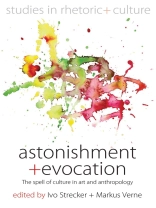All societies are shaped by arts, media, and other persuasive practices that can awe, captivate, enchant or otherwise seem to cast a spell on the audience. Likewise, scholarship itself often is driven by a sense of wonder and a willingness to be open to what lies beyond the obvious. This book broadens and deepens this perspective. Inspired by Stephen Tyler’s view of ethnography as an art of evocation, international scholars from the fields of aesthetics, anthropology, and rhetoric explore the spellbinding power of elusive meanings as people experience them in daily life and while gazing at works of art, watching films or studying other cultures. The book is divided into three parts covering the evocative power of visual art, the immersion in ritual and performance, and the reading, writing, and interpretation of texts. Taken as a whole, the contributions to the book demonstrate how astonishment and evocation deserve an important place in the conceptual repertoire of the human sciences.
Inhoudsopgave
Introduction
Ivo Strecker & Markus Verne
PRT I: IMAGE
Chapter 1. Do pictures stare? Thoughts about attention
Todd Oakley
Chapter 2. Gazing at paintings and the evocation of life
Philippe-Joseph Salazar
Chapter 3. Tangled up in blue. Symbolism and evocation
Boris Wiseman
Chapter 4. Co-presence, astonishment and evocation in cinematography
Ivo Strecker
PART II: PERFORMANCE
Chapter 5. Captivated by ritual. Visceral visitations and the evocation of community
Klaus-Peter Köpping
Chapter 6. The spell of riddles among the Witoto
Jürg Gasché
Chapter 7. Sounds of the Past. Music, history and astonishment
Markus Verne
Chapter 8. Tears, not so idle tears. Reflections on our entangled emotions and their disambiguation
James Fernandez
PART III: TEXT
Chapter 9. Stones, drumbeats, footprints and mysteries in the writing of the Other
Dennis Tedlock
Chapter 10. The translation of the said the unsaid in Sikkanese ritual texts
Douglas Lewis
Chapter 11. Ethnographic evocations and evocative ethnographies
Barbara Tedlock
Chapter 12. Reading public culture: Reason and excess in the newspaper
Robert Hariman
Over de auteur
Ivo Strecker is Emeritus Professor of cultural anthropology at the Johannes Gutenberg University of Mainz. He did and still does research with the Hamar in southern Ethiopia and has published widely about them. His film Father of the Goats (1984) received the “Prix Nanook” at the Bilan in Paris, and his theoretical study The Social Practice of Symbolization (1988) was selected by Choice as one of the “outstanding academic books of the year.” Together with Stephen Tyler and Robert Hariman he is editor of the Berghahn Books series Studies in Rhetoric and Culture.












